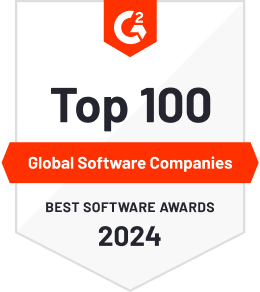
Global HR — 12 min

An international professional employer organization (PEO) or global PEO is a service company that helps businesses hire employees abroad. An international PEO compliantly takes care of international recruitment and payroll on behalf of other companies looking to expand globally.
An international PEO helps companies pay employees in multiple countries, but many businesses use domestic PEOs as well. Check out our article on what a PEO does for more information.
Just be careful because the term international PEO is often used interchangeably with just a PEO, which is incorrect. PEO refers to co-employment, i.e., an option that doesn’t apply to international hiring. While co-employment is a common arrangement in the United States, it’s restricted in many countries and could even be deemed illegal in some countries.
Bear in mind that when you enter into co-employment both you and the PEO are legally required to register a company or an entity in the same location as your employees. If your staff is in multiple countries, you’ll have to set up an entity in all of them, which – as you can imagine – is a complex and costly endeavor.
In order to recruit international employees legally without setting up an entity in each country you hire, you need to use an employer of record (EOR) which is sometimes also referred to as an international PEO. Let’s take a closer look at what this term actually means.
An EOR, which stands for an employer of record, helps companies legally hire and manage team members globally without having to set up entities in other countries. An EOR can help companies expand globally without having to go through the difficulties and costs of setting up multiple entities. The EOR takes on the role of local employer on the company’s behalf to manage payroll, benefits, taxation, contract setup, and legal compliance for your team members.
So as you can see, the terms international PEO and PEO are different and are often interpreted incorrectly. For a PEO to also act as an international PEO, the organization must legally offer EOR services for overseas employees.
That being said, it’s important to dive deeper into the concept of co-employment offered by PEOs and EORs. For example, if you are planning to use a PEO outside the US, it can be very expensive or even violate local employment legislation. We discuss this in more detail below.
When using a PEO for your international team, you need to consider two things: co-employment status and entity ownership.
Using a traditional PEO for a co-employment contract can violate local labor laws, because co-employment may not be accepted in certain countries. What’s more, you could face the threat of permanent establishment — meaning that you’re subject to taxes in that country. You might even need to pay a fine for avoiding formal registration.
Secondly, while PEOs can theoretically help you expand globally, if you choose a PEO provider that does not offer EOR services, you’ll need to create and register a new legal entity in each country where you hire. This can prove both risky and costly, for a couple of reasons:
Familiarizing yourself with international treaties. Many countries have special agreements which regulate any business, tax, and labor requirements and exemptions between states. The US, for instance, observes a multitude of tax treaties with other nations, which can be reviewed on the website of the Internal Revenue Service. Before you hire globally, it’s important to learn about how any existing agreements might regulate or help you navigate international employment.
Hiring a team with international business law expertise. To make sure that you register and set up your local entity properly, you will either need to hire an international business team or a legal representative in each country. You’ll also need to scout for local partners who can support you with payments, transfers, and employee benefits. Hiring experts in each country can be very expensive compared to working with a single EOR partner.
Recurring compliance and maintenance checks. After setting up entities in countries in which your employees reside, you need to make sure that your business is running compliantly in each country. This means ensuring that mandatory filings, surveys, and payments are done on a regular basis. You may need to additionally hire local financial partners or even corporate secretaries to meet these recurring corporate obligations, or risk penalties and fines. Doing a health check on your international entities is a lot of work, which can lead to more costs to operate internationally.
To sum up, it’s important to make sure that you own a local legal entity or work with an international hiring partner. An EOR can help you effectively hire and operate in multiple countries.
While discussing international PEO, you might run into the term “global PEO” or “global professional employer organization.” A global PEO functions exactly the same way as an international PEO. The terms international PEO and global PEO can be used interchangeably.
Some service providers also describe themselves as GEOs, which stand for global employment organizations. All of these refer to the same thing — the combination of PEO with EOR services. This allows businesses to legally hire employees overseas without the necessity of establishing an entity in every single country they recruit in.
With all of the above in mind, let’s summarize where the functions of an EOR and PEO overlap and how they differ.
An EOR, which stands for employer of record, allows organizations to employ global talent without the need to set up their own legal entities abroad. Among other services, EORs manage international payroll, taxes, benefits, and stock options. In other words, EORs ensure legal compliance in each country where you employ talent.
The biggest difference between a PEO and an EOR is that the former requires you to enter into a joint employment arrangement and set up an entity in each country you hire in. To help you figure out whether your business needs to work with a PEO or an EOR, here’s a breakdown of the biggest differences:
PEO
If you hire internationally with a PEO, you need to operate your own local entity (unless the PEO has EOR capabilities). Outside the US, PEOs might not act as the employer or co-employer.
You are solely responsible for compliance with local labor laws when hiring worldwide. This means you need to know international business law when using a PEO.
PEOs commonly observe operational minimums for their services (usually 5-10 employees).
You might face hidden insurance costs or be required to provide your own insurance for the hired employee.
EOR
An EOR acts as the sole employer of your international workers. They do not, however, interact with or influence your employee’s day-to-day work.
Employer of record services typically do not involve co-employment with another employer.
You can hire anywhere in the world, without setting up local legal entities.
EORs also offer HR support for your staff in outsourced locations.
With Remote, there are no employee minimums for EORs.
If you work with Remote, there will be no hidden costs and a transparent fee structure. Other EORs may have additional fees.
Whether you should use an EOR or a PEO depends on your circumstances and your expansion plans. If you own an entity in a country where you recruit employees, you can opt for a PEO.
Remote does not currently offer PEO services. However, our expert global employment team recommend reaching out to Sequoia One for advice on your specific needs. Combining the PEO services of Sequoia One with Remote gives you the option of both PEO and EOR services in one comprehensive package.
While you will be legally responsible for your hires, the PEO will provide you with HR support. In a situation where you don’t have a registered business in each location where you hire, and you don’t plan to set one up, you’ll have to use an international PEO that offers EOR services.
In this case, the EOR will be the legal employer, meaning that all your new hires will sign a contract with the EOR and not with your business.
Still you will have the deciding powers on company operations just like any employer. For example, you are the one who decides on your employee wages, responsibilities, and evaluates your employee’s performance. The only difference is if you work with an EOR, you’ll be able to recruit talent in every country where the EOR has a registered business. This will allow you to cut costs and save time when building a global workforce.
Bear in mind that some companies position themselves as global PEOs but lack EOR capabilities. In such a scenario, they will require you to create a legal entity in the location where you plan to source talent, which is counterproductive and financially draining. For this reason, before you sign a contract with an international PEO make sure they also offer EOR services.
While working with PEOs is a convenient solution for hiring in the US, there are several reasons why they might not be the best option for international employment. The main one is that PEOs rely on co-employment, which is not recognized (or is even deemed illegal) by certain countries.
While some PEOs offer guidance on international hiring, not all of them will be able to act as employers on paper. Here’s where working with an employer of record will be the best solution. With the help of an EOR, you can expand your operations into new markets without setting up a local entity – a process that is both costly and time-consuming. A good EOR partner will not only give you a kickstart but also help you pay and manage staff in other countries quickly and efficiently. To ensure that you’re compliant with international and local labor laws, it’s worth partnering with a company like Remote, which specializes in EOR services.
Remote works with a network of top payroll & HR experts, accountants, and international labor law attorneys based in each country. Our team handles all the intricacies of global HR for you, while our software makes it easy to manage staff.
With Remote’s EOR service, you’ll be able to:
Handle local payroll, taxes, benefits, and paid time off easily
Offer competitive benefits tailored to each country
Keep up with any legal changes and understand how they affect your business and employees
Avoid compliance mistakes
Consult local payroll and legal experts without third-party delays
Ensure your IP and invention rights are protected.
Take a look at our article giving you more details on EOR services. If you want to get a sense of the costs associated with working with an EOR and how much you can save compared to setting up your own legal entity, take a look at our pricing.
Start using Remote’s employer of record services and local entities to avoid the time, cost, and risk of building your own.

Subscribe to receive the latest
Remote blog posts and updates in your inbox.